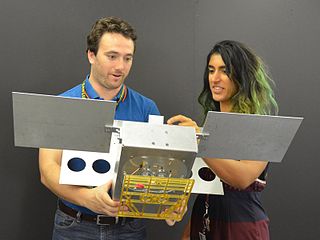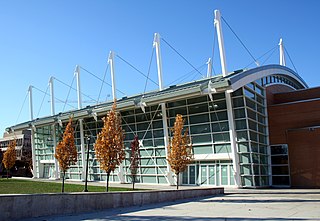Related Research Articles
Professional certification, trade certification, or professional designation, often called simply certification or qualification, is a designation earned by a person to assure qualification to perform a job or task. Not all certifications that use post-nominal letters are an acknowledgement of educational achievement, or an agency appointed to safeguard the public interest.
Software engineering is a systematic engineering approach to software development.

Engineers, as practitioners of engineering, are professionals who invent, design, analyze, build and test machines, complex systems, structures, gadgets and materials to fulfill functional objectives and requirements while considering the limitations imposed by practicality, regulation, safety and cost. The word engineer is derived from the Latin words ingeniare and ingenium ("cleverness"). The foundational qualifications of an engineer typically include a four-year bachelor's degree in an engineering discipline, or in some jurisdictions, a master's degree in an engineering discipline plus four to six years of peer-reviewed professional practice and passage of engineering board examinations. A professional engineer is typically a person registered under an Engineering Council.

An accountant is a practitioner of accounting or accountancy. Accountants who have demonstrated competency through their professional associations' certification exams are certified to use titles such as Chartered Accountant, Chartered Certified Accountant or Certified Public Accountant, or Registered Public Accountant. Such professionals are granted certain responsibilities by statute, such as the ability to certify an organization's financial statements, and may be held liable for professional misconduct. Non-qualified accountants may be employed by a qualified accountant, or may work independently without statutory privileges and obligations.

Certified Public Accountant (CPA) is the title of qualified accountants in numerous countries in the English-speaking world. It is generally equivalent to the title of chartered accountant in other English-speaking countries. In the United States, the CPA is a license to provide accounting services to the public. It is awarded by each of the 50 states for practice in that state. Additionally, all states except Hawaii have passed mobility laws to allow CPAs from other states to practice in their state. State licensing requirements vary, but the minimum standard requirements include passing the Uniform Certified Public Accountant Examination, 150 semester units of college education, and one year of accounting-related experience.

A civil engineer is a person who practices civil engineering – the application of planning, designing, constructing, maintaining, and operating infrastructure while protecting the public and environmental health, as well as improving existing infrastructure that may have been neglected.

Admission to the bar in the United States is the granting of permission by a particular court system to a lawyer to practice law in the jurisdiction and before those courts. Each U.S. state and similar jurisdiction has its own court system and sets its own rules for bar admission, which can lead to different admission standards among states. In most cases, a person is "admitted" or "called" to the bar of the highest court in the jurisdiction and is thereby authorized to practice law in the jurisdiction. Federal courts, although often overlapping in admission standards with states, set their own requirements for practice in each of those courts.
Regulation and licensure in engineering is established by various jurisdictions of the world to encourage life, public welfare, safety, well-being, then environment and other interests of the general public and to define the licensure process through which an engineer becomes licensed to practice engineering and to provide engineering professional services and engineered product to the public.
Licensure means a restricted practice or a restriction on the use of an occupational title, requiring a license. A license created under a "practice act" requires a license before performing a certain activity, such as driving a car on public roads. A license created under a "title act" restricts the use of a given occupational title to licensees, but anyone can perform the activity itself under a less restricted title. For example, in Oregon, anyone can practice counseling, but only licensees can call themselves "Licensed Professional Counselors." Thus depending on the type of law, practicing without a license may carry civil or criminal penalties or may be perfectly legal. For some occupations and professions, licensing is often granted through a professional body or a licensing board composed of practitioners who oversee the applications for licenses. This often involves accredited training and examinations, but varies a great deal for different activities and in different countries.
Software engineering professionalism is a movement to make software engineering a profession, with aspects such as degree and certification programs, professional associations, professional ethics, and government licensing. The field is a licensed discipline in Texas in the United States, Engineers Australia(Course Accreditation since 2001, not Licensing), and many provinces in Canada.

An agriculturist, agriculturalist, agrologist, or agronomist, is a professional in the science, practice, and management of agriculture and agribusiness. It is a regulated profession in Canada, India, the Philippines, the United States, and the European Union. Other names used to designate the profession include agricultural scientist, agricultural manager, agricultural planner, agriculture researcher, or agriculture policy maker.
Licensed Professional Counselor (LPC) is a licensure for mental health professionals in some countries.
An admission to practice law is acquired when a lawyer receives a license to practice law. In jurisdictions with two types of lawyer, as with barristers and solicitors, barristers must gain admission to the bar whereas for solicitors there are distinct practising certificates.
The Association of Technology, Management and Applied Engineering (ATMAE) sets standards for academic program accreditation, personal certification and professional development for educators and industry professionals involved in integrating technology, leadership and design. Its primary mission is faculty, students and industry professionals dedicated to solving complex technological problems and developing the competitive technologist and applied engineering workforce.
A Traffic Operations Practitioner Specialist (TOPS) is a certification sponsored by the Transportation Professional Certification Board, Inc., and promulgated by the Institute of Transportation Engineers. Prior to taking the required exam, an individual must have at least five years of related working experience, though academic experience may be substituted for this requirement. Additionally, as the certification is not intended for professionals, licensed professional engineers are not permitted to be a certified TOPS.
A professional transportation planner is a professional engaged in the practice of transportation planning, relating to the transportation aspects of urban planning and infrastructure planning.
Engineer in Training, or EIT, is a professional designation from the National Council of Examiners for Engineering and Surveying (NCEES) used in the United States to designate a person certified by the state as having completed two requirements:
The Society of Petroleum Engineers has a petroleum engineering certification program whereby it certifies the technical knowledge of petroleum engineers. The certification is granted based on an examination in conjunction with experience of the applicant. Once certified individuals must renew their certification annually to keep it current. A list of current SPE-certified petroleum engineers is available online.

Architectural engineering, also known as building engineering or architecture engineering, is an engineering discipline that deals with the technological aspects and multi-disciplinary approach to planning, design, construction and operation of buildings, such as analysis and integrated design of environmental systems, structural systems, behavior and properties of building components and materials, and construction management.

The International Requirements Engineering Board (IREB) e.V. was founded in Fürth in Germany in October 2006. IREB e.V. is as a legal entity based in Germany.
References
- ↑ "SEARCHABLE DIRECTORY". ITE. 2022-11-29. Retrieved 2022-11-29.
- ↑ "PTOE Requirements". 2017-11-26.
- ↑ "PTOE Exam Format". 2017-11-26.